Kiwi is a nutrient-dense fruit that may support digestion, immunity, and heart health—thanks to its exceptional vitamin C, fiber, and antioxidant content.
Understanding the health benefits of kiwi is important because this small, green fruit offers an impressive nutrient profile that supports overall wellness. From aiding digestion to promoting better sleep, kiwi can be an excellent addition to your daily diet.
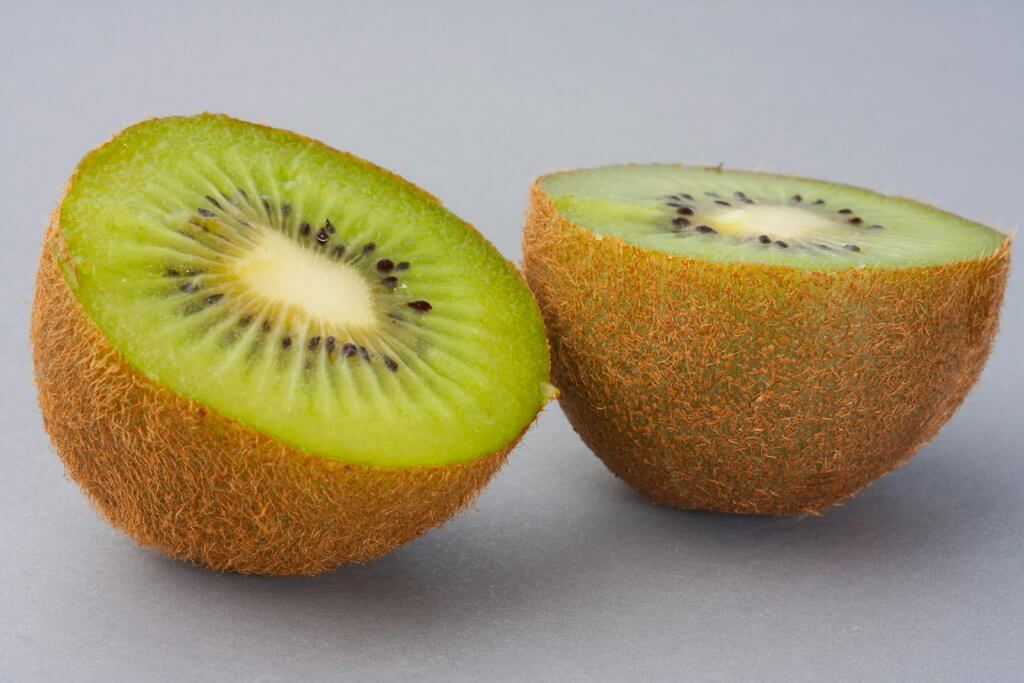
This guide explains the top 10 science-backed benefits of kiwi, its nutrition facts, how to include it in your diet safely, and key precautions to keep in mind.
What Is Kiwi?
Kiwi, also known as kiwifruit or Chinese gooseberry, is a small, oval-shaped fruit prized for its vibrant green or golden flesh and tangy-sweet flavor. Botanically, it belongs to the genus Actinidia, and the most widely cultivated species is Actinidia deliciosa.
Originally native to China, kiwi gained global recognition after being cultivated extensively in New Zealand during the early 20th century, where it received its now-famous name “kiwi,” inspired by the country’s national bird. Today, major kiwi producers include Italy, Chile, Greece, and New Zealand, with both green and gold varieties available worldwide.
There are two main types of kiwi commonly found in markets:
- Green Kiwi (Actinidia deliciosa) – recognizable by its fuzzy brown skin and bright green interior, this classic variety offers a tangy flavor and high fiber content.
- Gold Kiwi (Actinidia chinensis) – features smooth, bronze skin and yellow flesh that’s naturally sweeter and slightly less acidic than the green type.
Both varieties are rich in vitamin C, vitamin K, potassium, and antioxidants, but gold kiwis tend to provide slightly more vitamin C, while green kiwis have more fiber due to their edible seeds and skin.
Kiwi is often celebrated as a nutrient powerhouse in a small package, contributing to immune health, digestion, and overall wellness when enjoyed regularly as part of a balanced diet.
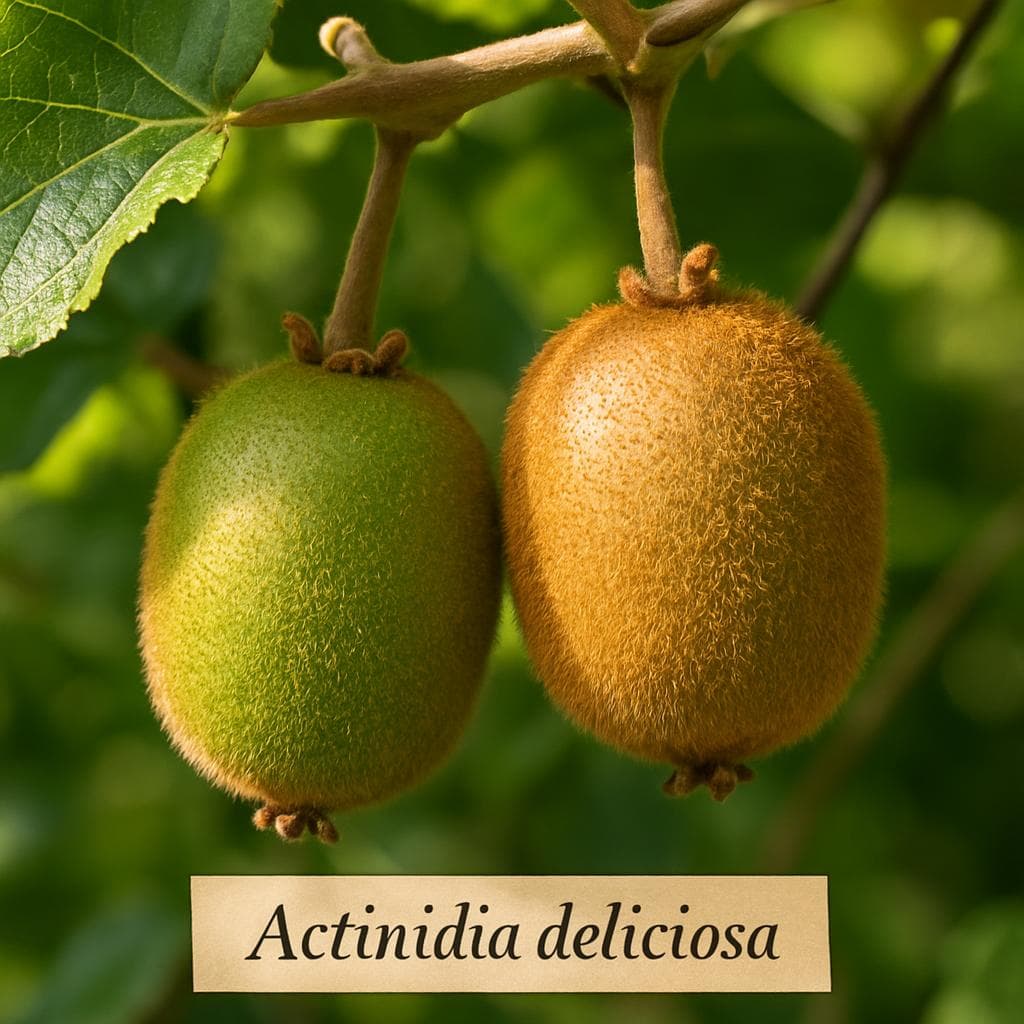
Nutritional Profile of Kiwi (Per 100 g)
Kiwi is a nutrient-dense yet low-calorie fruit, making it an ideal choice for those seeking both taste and health benefits. According to the U.S. Department of Agriculture (USDA) FoodData Central 2024, 100 grams of raw green kiwi provides the following nutrients:
| Nutrient | Amount (per 100 g) | % Daily Value (DV) |
|---|---|---|
| Calories | 41 kcal | — |
| Protein | 0.8 g | — |
| Carbohydrates | 10.1 g | — |
| Total Fiber | 2.1 g | 7% |
| Sugars | 8.9 g | — |
| Vitamin C | 92.7 mg | 103% |
| Vitamin K | 40.3 µg | 34% |
| Potassium | 312 mg | 7% |
| Folate (B9) | 25 µg | 6% |
| Water | 83% | — |
Source: USDA FoodData Central – Kiwifruit, Raw (2024)
This profile highlights kiwi as a fruit rich in vitamin C, vitamin K, and dietary fiber, with a low calorie count and high water content that supports hydration and digestive health. These qualities make kiwi an excellent addition to smoothies, salads, breakfast bowls, or as a refreshing snack on its own.
For optimal nutritional benefits, consume fresh kiwi with the skin when possible—after thorough washing—to maximize fiber and antioxidant intake.
10 Proven Health Benefits of Kiwi (Backed by Science)
Kiwi is a small yet powerful fruit loaded with essential vitamins, minerals, and plant compounds that support multiple aspects of health. Scientific studies have shown that its high vitamin C, fiber, and antioxidant content may benefit immunity, digestion, heart function, and more when included regularly in a balanced diet.
1. Supports Immune Function
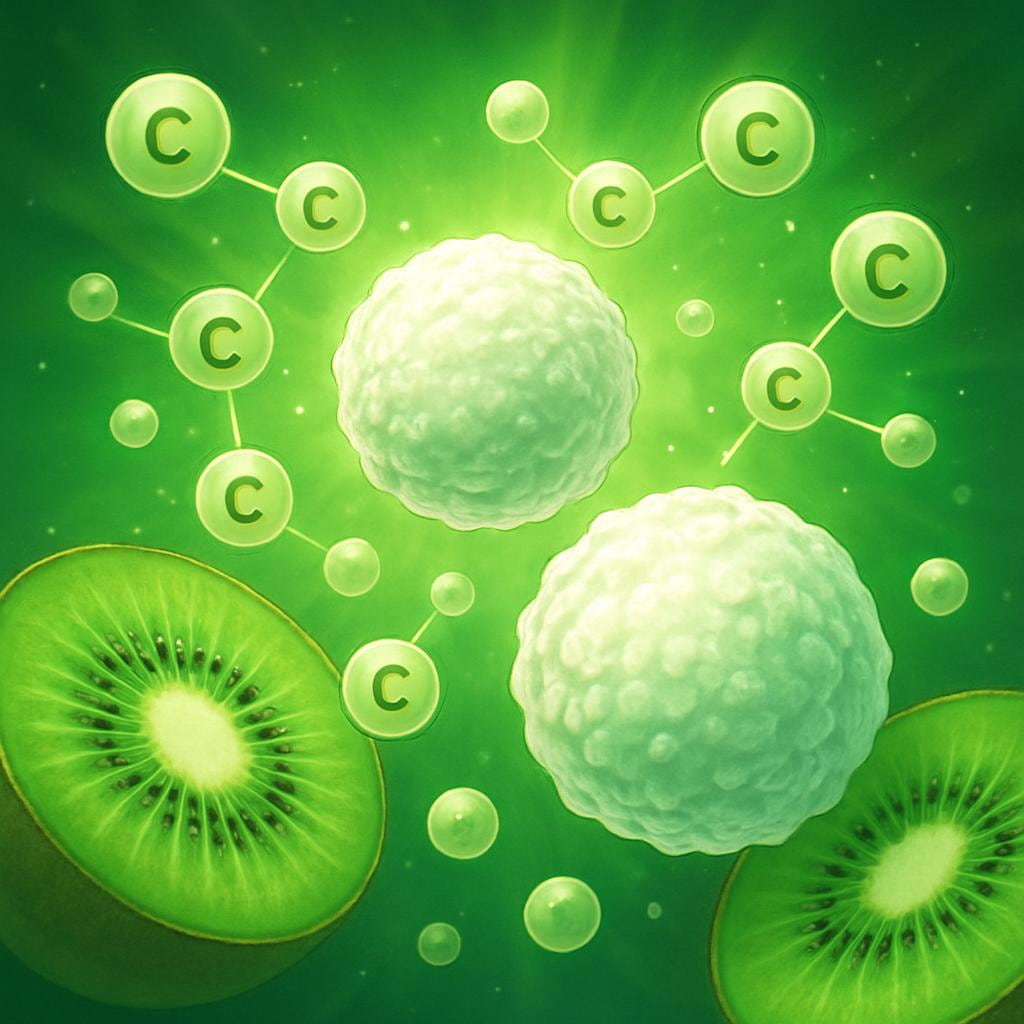
Kiwi is exceptionally rich in vitamin C, a vital antioxidant that supports the body’s normal immune defense. In fact, just one medium kiwi provides more than 100% of the Recommended Dietary Allowance (RDA) for vitamin C, helping maintain healthy immune cell function and resistance to everyday stressors.
A 2022 clinical trial published in the journal Antioxidants (MDPI) found that adults who consumed two SunGold kiwifruit daily for six weeks achieved optimal plasma vitamin C concentrations and improved antioxidant status compared to baseline. The study concluded that kiwi is a safe and effective whole-food source for maintaining healthy vitamin C levels without supplementation.
Here’s why this matters:
- Vitamin C supports white blood cell activity, including phagocytosis and chemotaxis, which are critical for fighting pathogens.
- Kiwi’s natural polyphenols, carotenoids, and folate may help reduce oxidative stress and inflammation that can weaken immune balance.
- A related trial in the British Journal of Nutrition reported that older adults who ate four gold kiwis daily experienced milder and shorter upper respiratory tract symptoms, along with higher plasma vitamin C and vitamin E levels (Cambridge University Press, 2012).
Practical tip: Adding one or two kiwis to your daily smoothie, salad, or breakfast bowl is an easy, natural way to help support immune function and meet your daily vitamin C needs—without relying solely on supplements.
Disclaimer: Kiwi may help support immune health as part of a balanced diet and lifestyle. It is not a substitute for medical treatment or professional healthcare advice.
2. Promotes Digestive Health
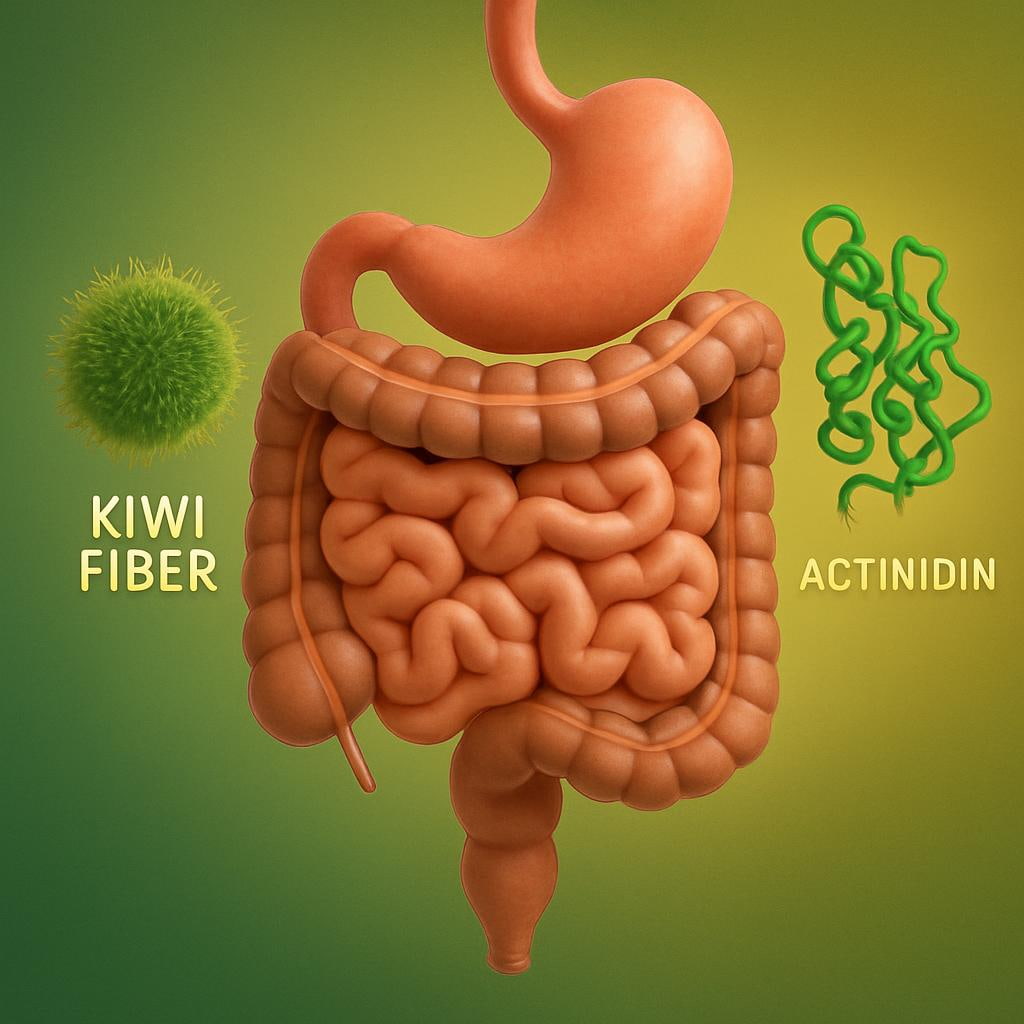
Kiwi contains actinidin, a natural enzyme that assists in breaking down proteins and supporting digestion. Research in the journal Nutrients (2022) found that consuming two green kiwis daily improved bowel regularity and reduced constipation symptoms in adults.
- Dietary fiber (2 g per kiwi) helps maintain gut motility and stool consistency.
- Kiwi’s combination of soluble and insoluble fibers nourishes beneficial gut bacteria, contributing to a healthy microbiome.
Regular intake of kiwi may support smoother digestion, nutrient absorption, and overall gastrointestinal comfort.
3. Supports Heart and Vascular Health

Kiwi’s blend of polyphenols, potassium, and fiber makes it highly beneficial for cardiovascular health.
A 2021 study in the European Journal of Nutrition found that participants who ate two kiwis daily experienced reduced LDL (“bad”) cholesterol and blood pressure levels.
- Potassium supports healthy blood pressure by balancing sodium intake.
- Fiber and antioxidants contribute to cholesterol regulation and vascular integrity.
Incorporating kiwi into your diet may help support heart function naturally when combined with other heart-healthy foods like nuts, oats, and olive oil.
4. May Aid Blood Sugar Balance
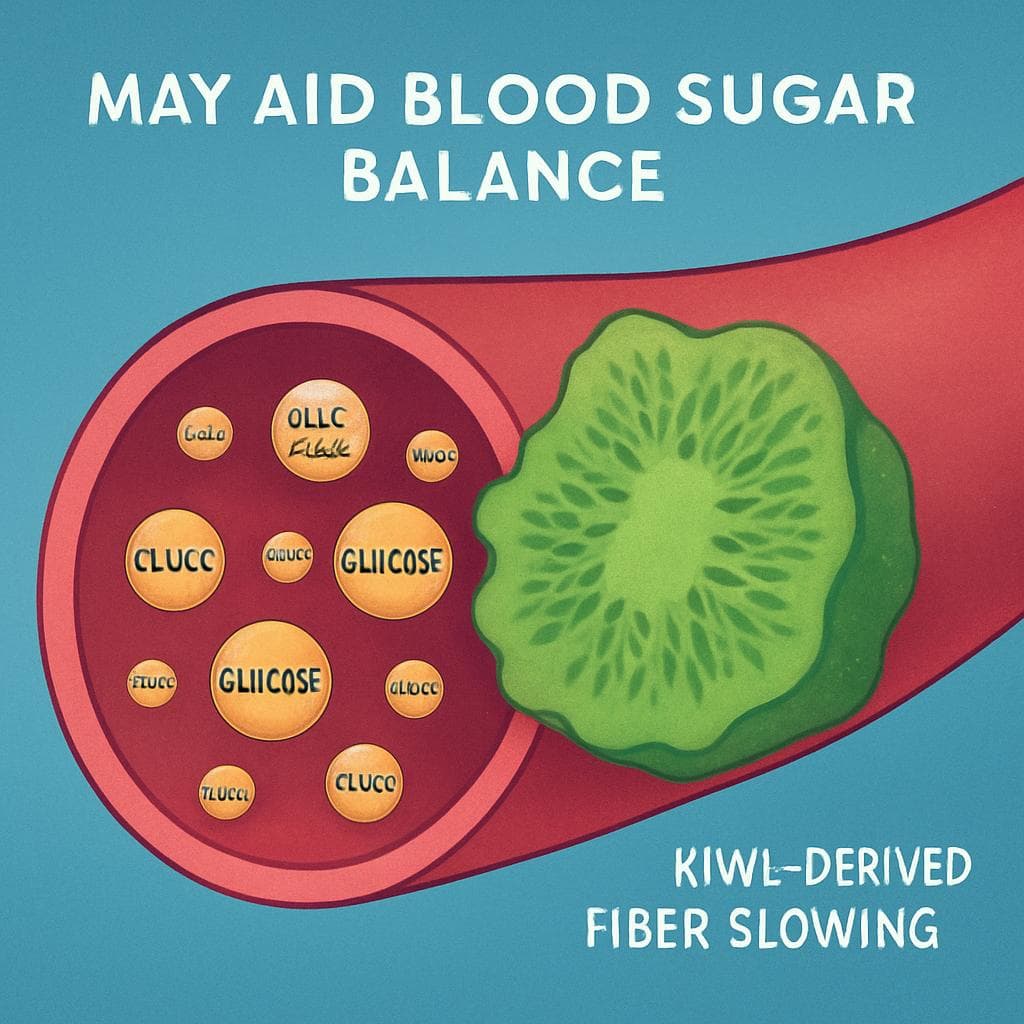
Despite its sweetness, kiwi has a low glycemic index (GI ≈ 50), meaning it releases sugar slowly into the bloodstream.
Research published in Food & Function (2022) found that kiwi consumption helped improve glycemic control and insulin sensitivity in adults.
- The fiber and polyphenols in kiwi may help reduce post-meal glucose spikes.
- Kiwi makes a smart dessert option for those managing blood sugar when eaten in moderation.
For best results, pair kiwi with protein or healthy fats—such as yogurt or chia seeds—to further stabilize energy levels.
5. Supports Healthy Skin and Collagen Formation

Kiwi is one of the most vitamin C–rich fruits, providing powerful support for collagen synthesis, the structural protein responsible for maintaining skin elasticity, firmness, and hydration. According to the Harvard T.H. Chan School of Public Health, vitamin C acts as an essential cofactor in collagen formation and helps neutralize free radicals that contribute to skin aging and oxidative stress.
Each medium kiwi provides over 90 mg of vitamin C—more than an orange—making it an excellent natural way to boost skin nutrition. This antioxidant vitamin also enhances the regeneration of vitamin E, further strengthening the skin’s protective barrier against environmental stressors.
Kiwi also contains lutein and zeaxanthin, two carotenoids that may help defend skin cells from UV-induced oxidative damage, supporting a brighter and more even complexion. Combined with its hydration and fiber content, kiwi supports the body’s natural repair mechanisms that maintain skin smoothness and tone.
Pro Tip: For glowing skin, pair kiwi with vitamin E–rich foods like almonds, sunflower seeds, or avocados to create an antioxidant synergy that supports healthy, radiant skin from within.
Disclaimer: Kiwi may help support skin health and collagen formation as part of a balanced, nutrient-rich diet. This content is for informational purposes only and not medical advice.
6. Aids Sleep and Relaxation

Kiwi may help promote natural sleep quality due to its content of serotonin, antioxidants, and folate.
In a study published in the Asia Pacific Journal of Clinical Nutrition (2020), participants who ate two kiwis an hour before bedtime reported shorter sleep onset times, longer duration, and better overall sleep quality.
- Serotonin in kiwi supports relaxation and regulates sleep cycles.
- Folate and magnesium contribute to reduced fatigue and stress management.
Enjoying kiwi as an evening snack may support restful sleep without added sugars or artificial ingredients.
7. Supports Eye Health

Kiwi is abundant in lutein and zeaxanthin, two carotenoids essential for maintaining retinal health.
A 2021 analysis in Nutrients associated higher intake of kiwi and other carotenoid-rich fruits with a reduced risk of age-related macular degeneration (AMD).
- Vitamin C adds extra protection against oxidative damage to eye tissues.
- Regular intake supports long-term visual clarity and eye comfort.
Including kiwi, spinach, and carrots in your diet may help sustain healthy vision as you age.
8. May Support Mood and Cognitive Function

Kiwi may positively influence mood, energy, and mental clarity, largely due to its exceptional vitamin C and antioxidant content. Vitamin C is essential for the production of neurotransmitters like dopamine and serotonin, which help regulate mood, motivation, and cognitive performance.
A 2023 human trial published in the British Journal of Nutrition by researchers at the University of Otago, New Zealand, found that adults with low vitamin C levels who consumed two kiwifruit daily for four weeks experienced faster and more sustained improvements in mood, vitality, and energy compared to those taking a vitamin C supplement. The study highlighted that kiwi’s natural combination of vitamin C, fiber, and antioxidants may work synergistically to enhance mental well-being more effectively than isolated nutrients.
Further evidence from the University of Otago Newsroom supports these findings, noting that mood improvements were measurable within just four days of regular kiwi consumption.
Here’s why kiwi may support brain wellness:
- Vitamin C supports neurotransmitter synthesis and helps protect neurons from oxidative stress.
- Antioxidants and folate found in kiwi contribute to reduced inflammation and improved nerve signaling.
- Its natural sugars and fiber help maintain stable energy and blood glucose—important for sustained mental focus.
Tip: Enjoy one or two fresh kiwis daily as part of a balanced diet to naturally support mood stability and cognitive function—especially if your vitamin C intake is low.
Disclaimer: Kiwi may help support mood and cognitive health when included in a balanced, nutrient-rich diet. This content is for informational purposes only and not medical advice.
9. Helps Maintain Healthy Weight
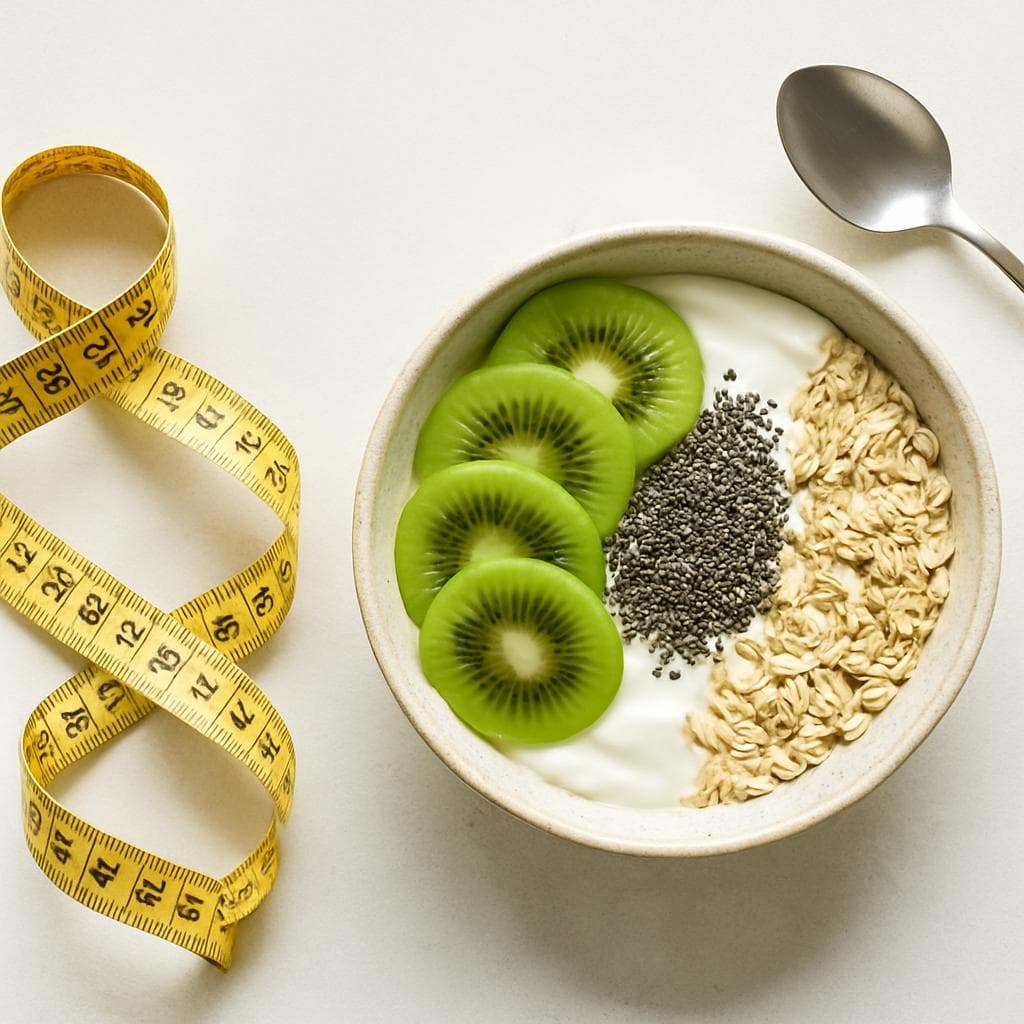
Kiwi is naturally low in calories (about 40 kcal per fruit) and high in fiber and water, making it ideal for balanced weight management.
According to the Cleveland Clinic, its fiber content promotes satiety, which helps regulate appetite and prevent overeating.
- Two kiwis provide about 4 g of dietary fiber and 83% water content.
- Great for mid-day snacking, smoothies, or breakfast bowls.
Replacing high-sugar desserts with kiwi can support healthy calorie balance and overall nutrition.
10. Promotes Gut Microbiome Balance
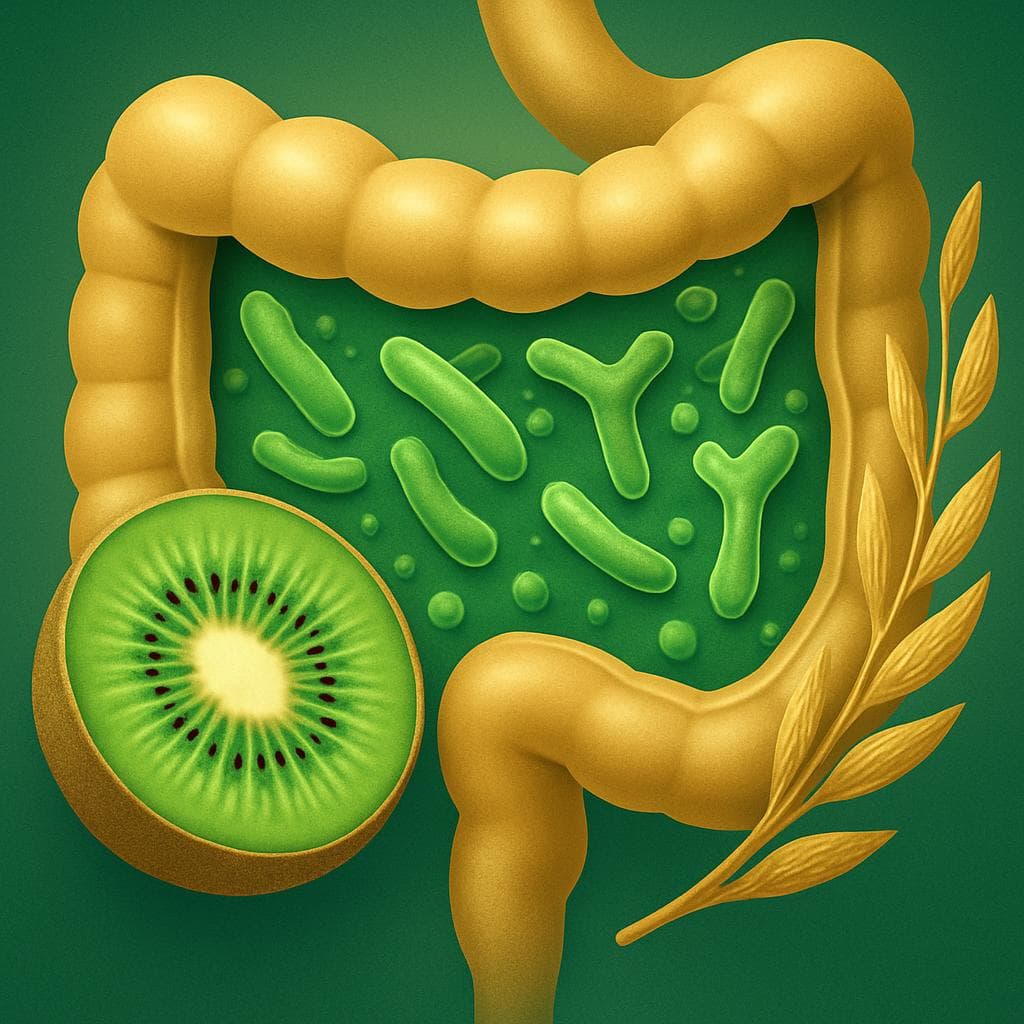
Kiwi is a natural prebiotic food that supports a healthy gut microbiome—one of the body’s key foundations for digestion, metabolism, and immune function. Its unique combination of dietary fiber, polyphenols, and natural enzymes helps nourish beneficial gut bacteria and improve digestive balance.
A 2022 study published in Frontiers in Nutrition found that kiwi fiber and polyphenols promote the growth of Lactobacillus and Bifidobacterium species—two beneficial bacterial groups linked to gut health and immune resilience. The researchers observed that regular kiwi intake improved stool frequency, gut motility, and overall microbial diversity without adverse effects.
Complementary findings in the International Journal of Molecular Sciences (2024) highlight that kiwi’s prebiotic compounds may increase short-chain fatty acid (SCFA) production—such as butyrate—which plays a key role in maintaining gut lining integrity and reducing inflammation.
How it supports digestive wellness:
- Prebiotic fibers in kiwi feed beneficial gut microbes, improving microbial diversity.
- Polyphenols and antioxidants may reduce gut inflammation and oxidative stress.
- A balanced microbiome supports efficient nutrient absorption and immune function.
Tip: Combine kiwi with probiotic-rich foods like plain yogurt, kefir, or fermented oats to enhance both prebiotic and probiotic effects. This balanced combination may help support regular digestion, smoother bowel movements, and long-term gut wellness.
Disclaimer: Kiwi may help support gut microbiome balance as part of a healthy, nutrient-rich diet. This content is for informational purposes only and not medical advice.
How to Eat Kiwi for Best Results
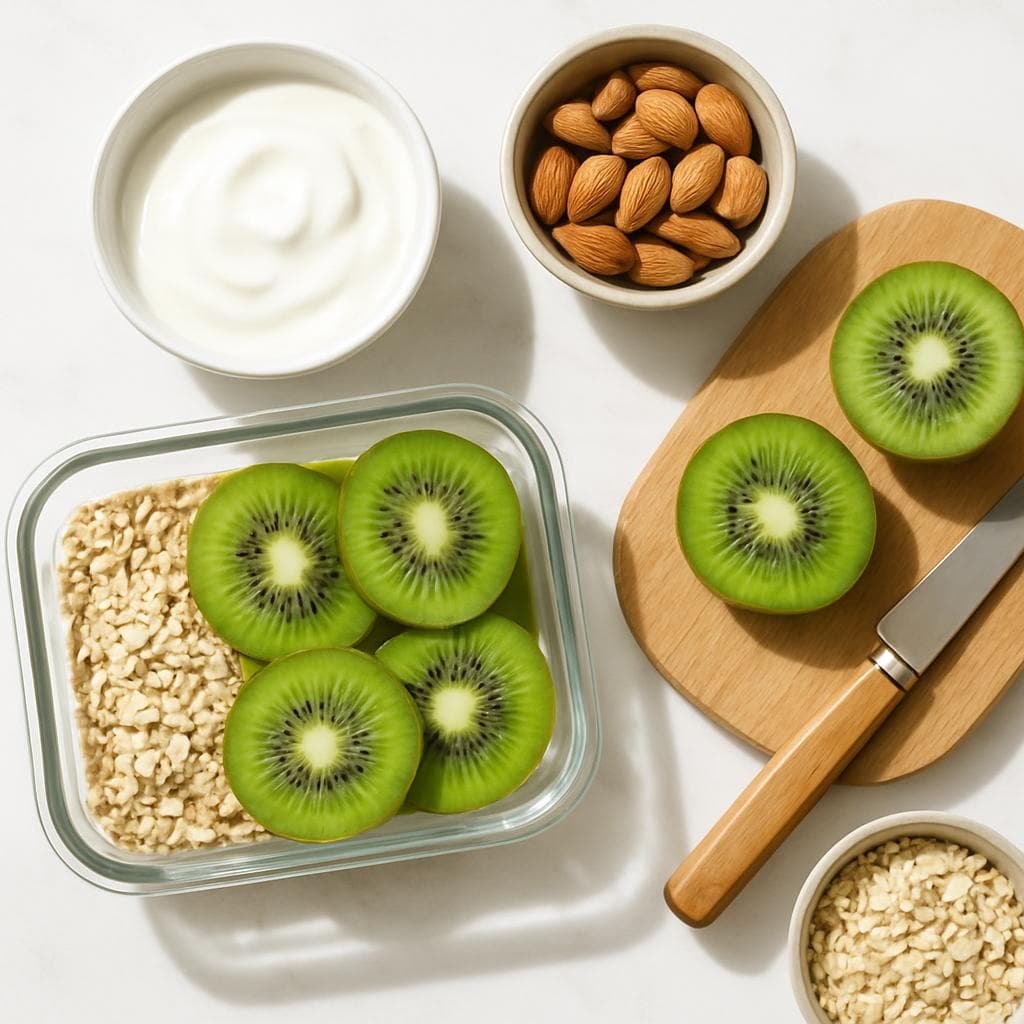
Kiwi is both versatile and easy to include in your daily diet. When eaten correctly and consistently, it may support immunity, digestion, skin health, and overall wellness.
Recommended Serving Size:
Eating 1–2 kiwis per day is generally ideal for most adults. This serving provides over 100% of your daily vitamin C needs, along with fiber, antioxidants, and essential minerals like potassium and folate.
Best Time to Eat:
- Morning: Enjoy kiwi on an empty stomach or with breakfast to maximize vitamin C absorption and energize your day.
- Post-Meal: Having kiwi after a protein-rich meal may aid digestion because of its natural enzyme actinidin, which supports protein breakdown.
Preparation Tips:
- With or Without Skin: The skin is edible and high in fiber and antioxidants. Wash thoroughly under running water before eating whole.
- For Smooth Texture: Scoop out the flesh with a spoon or slice it into salads, oatmeal, or yogurt bowls.
- Juices or Smoothies: Blend kiwi with spinach, banana, and Greek yogurt for a nutrient-dense green smoothie.
Pairing for Nutrient Synergy:
Combine kiwi with:
- Vitamin E–rich foods such as almonds, sunflower seeds, or avocado to enhance antioxidant absorption.
- Probiotic foods like plain yogurt or kefir to support gut health.
- High-fiber grains like oats or chia for improved satiety and digestion.
For maximum freshness, store ripe kiwis in the refrigerator at ≤ 40 °F (4 °C) and consume within 5–7 days.
Possible Side Effects and Precautions
Kiwi is safe and highly nutritious for most people, but a few precautions should be considered—especially for those with allergies or certain health conditions.
1. Allergies and Cross-Reactivity:
Some people may experience Oral Allergy Syndrome (OAS)—itching or mild swelling of the lips, mouth, or throat—after eating raw kiwi. This occurs when proteins in kiwi resemble those in pollen or latex, triggering a mild allergic reaction.
According to the Cleveland Clinic and the American College of Allergy, Asthma & Immunology (ACAAI), kiwi is a known trigger for latex–fruit syndrome, especially in people allergic to latex, birch pollen, or bananas.
If you notice tingling or itching after eating kiwi, avoid raw forms and consult a healthcare professional or allergist for evaluation.
2. Medication Interactions (Vitamin K):
Kiwi contains vitamin K, which may interfere with blood-thinning medications such as warfarin. Individuals on anticoagulant therapy should keep their vitamin K intake consistent and consult a healthcare provider. See NIH Office of Dietary Supplements – Vitamin K Fact Sheet.
3. Oxalate Consideration:
Kiwi naturally contains oxalates, which may contribute to kidney stone formation in susceptible individuals. Those with a history of kidney stones should moderate intake and ensure proper hydration.
4. Storage and Food Safety:
Proper storage and handling are essential to keep kiwi fresh, nutritious, and safe to eat. Following the U.S. Food and Drug Administration (FDA) produce safety recommendations helps prevent contamination and preserve nutrients.
To ensure safety and quality:
- Wash kiwi under clean running water before cutting or eating to remove dirt and bacteria. Even if you plan to peel it, washing prevents transfer of contaminants from the skin to the flesh.
- Avoid washing before storage, as excess moisture can speed up spoilage and mold growth.
- Refrigerate ripe kiwi promptly at or below 40°F (4°C) to maintain freshness and slow bacterial growth.
- Separate produce from raw meat, poultry, and seafood to avoid cross-contamination. Always use clean utensils, cutting boards, and surfaces.
According to the FDA – Produce Safety Tips for Consumers, washing fruits under running water and storing them properly are simple yet effective ways to reduce the risk of foodborne illness.
Tip: Store unripe kiwis at room temperature until they soften. Once ripe, refrigerate them in a breathable container or produce drawer to extend shelf life and preserve nutrients.
Frequently Asked Questions (FAQ)
Q1. How many kiwis can I eat a day?
Most adults benefit from eating 1–2 kiwis daily, which provides ample vitamin C, fiber, and antioxidants for immune and digestive support.
Q2. Is kiwi good for people with diabetes?
Yes. Kiwi has a low glycemic index (GI ≈ 50) and high fiber content that helps regulate blood sugar when eaten in moderation. Pair it with protein or healthy fats for better glucose balance.
Q3. Can you eat the skin of kiwi?
Yes. The skin is edible and provides additional fiber and antioxidants. Wash the fruit thoroughly before eating to remove surface residues.
Q4. Is kiwi safe during pregnancy?
Yes. Kiwi offers folate, vitamin C, and fiber that support maternal and fetal health. Always choose fresh, ripe fruit and consult your healthcare provider for personalized nutrition guidance.
Q5. Does kiwi help with digestion or constipation?
Yes. Kiwi contains actinidin and soluble fiber that may support bowel regularity and promote smooth digestion. Studies show it can be particularly helpful for mild constipation.
Q6. What’s the best way to store kiwi?
Store ripe kiwis in the refrigerator at ≤ 40 °F (4 °C). Keep unripe ones at room temperature until they soften. Proper storage maintains nutrients and flavor.
Conclusion
Kiwi is a nutrient-dense superfruit packed with vitamin C, fiber, antioxidants, and plant compounds that may support immunity, digestion, heart health, skin vitality, and overall well-being. Including 1–2 kiwis a day in a balanced diet is an easy and delicious way to strengthen your nutritional foundation.
For best results, enjoy kiwi fresh, combine it with vitamin E-rich foods for added antioxidant power, and follow safe food-handling practices.
This content is for informational purposes only and not medical advice.
References:
- USDA FoodData Central – Kiwifruit, Raw (2024)
- Antioxidants (MDPI, 2024) – “SunGold Kiwifruit Restores Vitamin C Status and Improves Antioxidant Defense in Adults”
- British Journal of Nutrition (2024) – “Kiwifruit Improves Mood and Vitality in Adults with Low Vitamin C Status”
- Frontiers in Nutrition (2022) – “Kiwifruit-Derived Polysaccharides Modulate Gut Microbiota and Enhance Digestive Health”
- International Journal of Molecular Sciences (2024) – “Health Effects of Kiwifruit Polyphenols on the Gut Microbiome and Metabolism”
